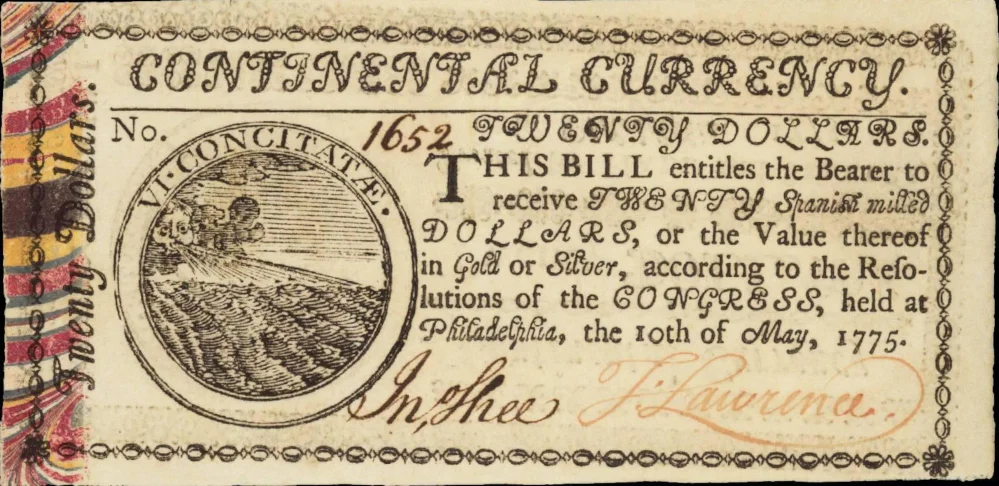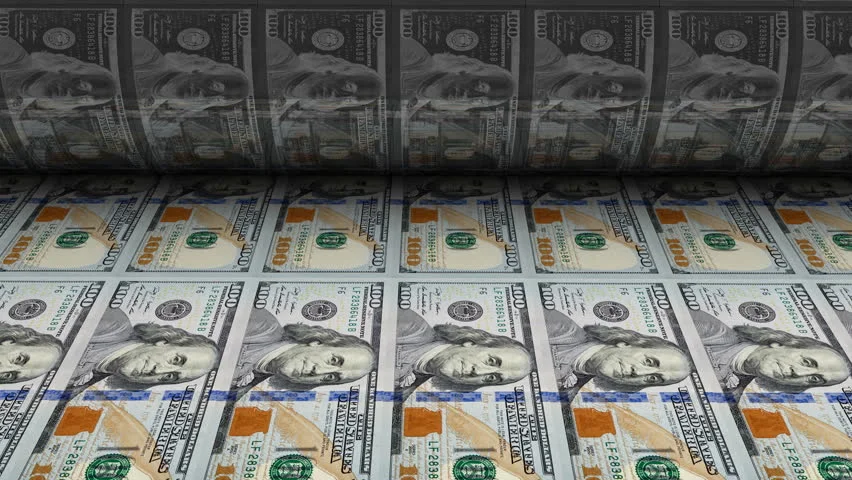Not Worth a Continental
Not Worth a Continental
The phrase, “Not worth a Continental,” will soon be commonly known for the same reasons that it was said in the early Republic: the USA are broke and the paper money is becoming worthless. Like in 1787 and 1791, the solution to the debt and growing unrest is the Constitution and the Bill of Rights.
During the American Revolutionary War (1775-1783), the Continental Congress and the Congress under the Articles of Confederation (1777-1789) printed paper money (Continentals) because they did not have enough gold and silver money to pay for the war.[1]
Evidently bankers aren’t keen on lending to a militia going to war with one of the most powerful empires in the world.
After the war, Shay’s Rebellion (1786-1787) occurred because newly independent Massachusetts was taxing people’s whiskey in silver and gold to pay off their share of the paper Continentals at face value.[2] Many of those rebelling were veterans of the War for Independence and were paid for their service in Continentals. As the Continentals were continuously printed beyond the gold and silver taxes available to pay them off, they lost face value, prices rose, and many soldiers sold them to speculators for pennies on the dollar, who now wanted the veterans to pay off the Continentals at face value. Add in that many people were losing their properties to debt collectors, and one has a recipe for rebellion.
Shay’s Rebellion served as a call to reform the Articles of Confederation. The result was the Constitution (Constitution Convention in 1787, ratified in 1788).[3]
With the Continentals in mind, the Constitution did not grant the power of printing paper money to the Congress and the States were prohibited from using anything but gold and silver as payments of debts.[4]
Article I, Section 8, paragraphs 5 and 6 state,
“The Congress shall have Power…
To coin Money, regulate the Value thereof, and of foreign Coin, and fix the Standard of Weights and Measures;
To provide for the Punishment of counterfeiting the Securities and current Coin of the United States;”
Article I, Section 10, paragraph 1 states,
“No State shall… coin Money; emit Bills of Credit; make any Thing but gold and silver Coin a Tender in Payment of Debts…”
However, the new Constitutional Congress was empowered to pay off the debts of the states,[5] which resulted in a tax on whiskey to pay off both the debts and the paper Continentals at face value in silver and gold (thanks, Alexander Hamilton).
The Whiskey Rebellion (1791-1794) was the further result. Congress called up the militia and President George Washington led them to defeat the rebels in a small battle in 1794. Washington declared victory, pardoned the rebels, and went home. In the end, majority of whiskey producers, living on the frontier, refused to pay the tax (not that many tax collectors were brave enough to try to collect it) and the Continentals were never paid off entirely.[6]
Indeed, the whiskey rebels were able to successfully nullify the whiskey tax in part because the Bill of Rights were popularly amended to the Constitution in December 1791- including due process and the right to bear arms. Practically, civil disobedience is most respected when a society is well armed. Luckily, Americans are the most heavily armed people in the world. When we default back to the Constitution, we’ll be able to provide the necessary security for a free state.
As with the Continentals, the dollars of today will be revalued against gold and silver at pennies on the dollar, the USA will default back to the Constitution, and those holding paper money will learn the hard way, the phrase, “Not worth a Continental.”
End Note:
Some people may make the argument that since the Federal Government was not denied the power to print paper money and since it was only the states that were denied coining money, the Federal government could technically continue to print money to pay off debts. That argument may have held weight prior to 1791. However, with the reasons for Shay’s Rebellion and the Whiskey Rebellion in mind, the 10th Amendment (1791) was amended to the Constitution and states,
“The powers not delegated to the United States by the Constitution, nor prohibited by it to the States, are reserved to the States respectively, or to the people.”
[1] https://mises.org/library/not-worth-continental
[2] https://mises.org/wire/shayss-rebellion-excuse-centralized-american-state
[3] https://www.archives.gov/founding-docs/more-perfect-union
[4] http://constitutionus.com/
[5] Article I, Section 8, Paragraph 1
[6] https://mises.org/library/whisky-rebellion-model-our-timeÂ




